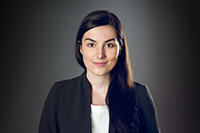
Dr Magdalena Matczak PhD
Marie Skłodowska-Curie Research Fellow Archaeology, Classics and Egyptology
- Work email M.Matczak@liverpool.ac.uk
- Personal Websitehttp://magdalenamatczak.com/
- ACADEMIAAcademia profile
- About
- Research
- Publications
- Professional Activities
Research
Disease and disability in medieval and modern Europe
My principal research areas include social perception of disease and disability, folk classifications of diseases, social status and burial customs (including atypical burials) of disabled and diseased people, medical therapeutics, and saints in medieval and early modern Europe.
DIS-ABLED: Past Lifeways and Deathways of the Disabled in 14th-18th Century Central Europe
My new project, ‘DIS-ABLED: Past Lifeways and Deathways of the Disabled in 14th-18th Century Central Europe: an Interdisciplinary Study’, is based at the University of Liverpool in partnership with Arizona State University and Adam Mickiewicz University in Poznan, Poland. The project is in collaboration with Dr Jessica Pearson, Professor Jane Buikstra and Professor Andrzej Marek Wyrwa. The research is funded by the European Commission within the framework of the Marie Skłodowska-Curie Actions.
‘DIS-ABLED’ uncovers the heritage of disabled people from Central Europe that is part of European and global heritage. The main objective is to reconstruct the lifeways and deathways of the disabled in 14th-18th century Central Europe. The project explores the compatibility of contemporary and past definitions of disability. How did people define disability and which afflictions were perceived as disabilities? Were the same diseases and conditions defined as disabilities in the past as are now? How were the disabled treated in their societies? Did disabilities influence the manner of burial, e.g. atypical burials?
The answers to those questions are found through a detailed study of skeletons and integration of these data with an extensive literature review on health, disease and disability in Central Europe. The project encompasses four fields: bioarchaeology, archaeology, history and ethnography. This approach embeds ‘DIS-ABLED’ in the biohumanities, which advocate a complementary and interdisciplinary approach connecting social studies and humanities with biology to study phenomena like disability.
Body and heritage
I am also interested in the body as a heritage in post-socialist Central Europe.
Research Grants
DIS-ABLED Past Lifeways and Deathways of the Disabled in 14th-18th Century Central Europe: an Interdisciplinary Study
EUROPEAN COMMISSION
August 2018 - November 2021